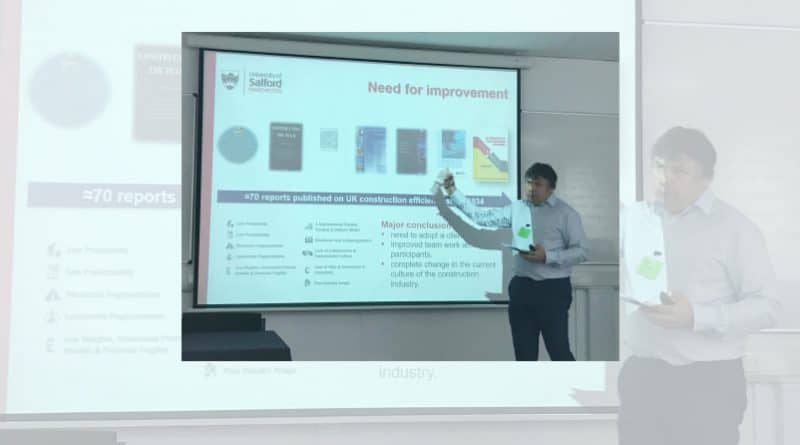Benefits of Academia & Industry Partnerships
Professor Jason Underwood spoke with Irish building magazine about the benefits of partnerships between academia and industry – developing multi-skilled professionals and providing solutions to business problems. A leader in UK Digital Construction, Jason brings academia and industry together by offering companies a portfolio of partnering options.
Jason Underwood is Professor of Digital Built Environments & Construction ICT and Programme Director of the MSc. in BIM & Digital Built Environments at the University of Salford. He is the present Chair of the UK BIM Academic Forum and Director of Construct IT For Business; an industry-led non-profit-making collaborative membership-based network. He is also Editor-in-Chief of the International Journal of Digital Innovation in the Built Environments (IJDIBE). Jason brings nearly 3 decades of experience to his roles.
At national and regional level, Jason is actively engaged in the digital transformation of the UK construction industry through a number of affiliations. This is just a brief description of his work in BIM/Digital Transformation education, industry and academic memberships and roles. He is also a Chartered Psychologist, with an interest in soft skills and the psychology of effective collaboration.
 Jason’s path to professorship was an unplanned journey. “I got into academia by accident. Having studied civil engineering at university and worked in industry as an engineer, I returned to academia to undertake a PhD in the field of construction ICT at the University of Salford, as a result of the recession in the early 90s. The focus of my PhD was on addressing constructability issues at the design stage through the utilisation of ICT, which originated from my site experience. Following my PhD, I secured several research positions at the University of Salford, where my early research work focused on exploring and demonstrating the concept of integrated construction computing. This is how I got into what is now known as ‘BIM/Digital Construction’ and my academic career continued to evolve from there.”
Jason’s path to professorship was an unplanned journey. “I got into academia by accident. Having studied civil engineering at university and worked in industry as an engineer, I returned to academia to undertake a PhD in the field of construction ICT at the University of Salford, as a result of the recession in the early 90s. The focus of my PhD was on addressing constructability issues at the design stage through the utilisation of ICT, which originated from my site experience. Following my PhD, I secured several research positions at the University of Salford, where my early research work focused on exploring and demonstrating the concept of integrated construction computing. This is how I got into what is now known as ‘BIM/Digital Construction’ and my academic career continued to evolve from there.”
Jason took an advantageous break from academia to enter the technology industry. “I went into the tech world to develop knowledge-based systems for the construction industry, before returning to academia as a researcher on an EU-funded project at the University of Leeds.” In 2001, he was approached to return to the University of Salford as Manager of Construct IT, where he went on to become a lecturer, senior lecturer and finally a professor.
Partnering
At the University of Salford, Jason has been in a role he is suited for; bringing academia and industry together and working between the two. “One of my fortes is to be able to work between academia and industry. BIM and digital skills are seen as important with regards to employability. Across the board we have seen a shift to partnerships, whereby industry is seeing the value from engaging with academia. This has been a major change for me.”
Building a longer-term relationship is now the goal for many large companies, and Jason witnesses this. “It comes down to individuals and building relationships. Organisations need the right graduates with the right skillsets, which can be effectively enabled through industry and academia coming together to collaboratively work together on delivering that through developing undergraduate and postgraduate programmes, working on research projects to support business development, while feeding back into informing our teaching, research and enterprise.”
Portfolio of Options
Jason has developed a strategy to support organisations in their digital transformational journey. “Over the last 4 to 5 years, I have been developing a strategy of a portfolio provision to support organisations on their digital transformational journeys, which includes education through the taught MSc. programme, student placements and collaborative projects to support companies develop their digital capacity, which in turn, facilitates student career development.” Eventually, these students progress their careers and join regional and national boards and committees to facilitate the wider industry digital transformation, while returning to give guest lectures on their experiences. “It comes 360 degrees whereby we get back what we put in, it is an evolving process. This serves to build and strengthen the relationship with the organisation, they get a skilled professional who is involved in driving digital transformation change within the organisation and also the wider-industry by actively engaging in industry committees; bringing knowledge back to the company.”
Curious, we ask how Jason first engages with companies. “It varies; some companies approach me with regard to student placements or getting access to students as part of their recruitment or to support to develop their business digital capability through collaborative projects. However, initially, I will explore where companies are on their digital transformational journey and then discuss our portfolio of education, research, student placements, enterprise activities, etc. to determine how we can best support them. It’s about having a conversation around where we can build effective longer-term relationships, and support one another on the journey. But it is also about individuals having a shared understanding and vision; it always comes down to individuals to build an effective longer-term collaborative relationship.” Jason knows what companies want and the knowledge and skills graduates need to have to develop their careers.
Given his role, we expect Jason to put an emphasis on technical skills, and he does, but he also emphasises the need for developing the required softer interpersonal skills, as teamwork is essential on projects, including through education. “There is an emphasis on digital skills, especially the technical skills, which are important. However, as we continue to discuss within the UK BIM Academic Forum, we need more focus on developing students’ interpersonal skills to develop them as effective collaborators. I believe degrees develop technically competent graduates, but what the industry needs now is graduates that also have the softer interpersonal skillsets required; to develop and lead effective teams. This is a current challenge for the industry to develop these skills at present; with companies investing in coaching and in-house training.”
Several of the students from the MSc. BIM & Digital Built Environments programme began working on collaborative projects between industry and the university, which gave them employability opportunities to gain invaluable experience, while studying. These students have then gone on to drive digital transformation change within their own organisations, while also being involved on national and regional committees to drive wider industry change, and facilitate developing the required capacity in the sector. “This is encouraging in my job,” Jason adds. The course also has a good balance between national and international students and there continues to be a good Irish presence. “Every year we have students on the programme from Ireland and who remain working in Ireland, which is not only a benefit to us, but is also to driving change in the Irish sector and a wider global industry transformation.”
Seeing Value
Over the past decade, companies are seeing the value in the students they are recruiting from the BIM programme. “I have companies asking ‘How do they get access to our students?’ My response is to invite them in to give a guest lecture, explore placements to facilitate their business development, etc.; giving them early access. This will also enable them to shape the curriculum to ensure graduates are fit for purpose.” Companies are seeing value now, for example, they are also investing in employees studying for a PhD; both for individual professional development and to also support business development. “They are focused on R&D to support developing the business on their digital transformation journey and are investing. There is a business development advantage for an employee’s professional development, as well as the organisation and its business development, by them undertaking a PhD.”
Jason’s advice to companies is to get engaged with higher education. “Higher education wants to develop graduates that are fit-for-purpose; today and for the future. Get involved with your local college; in shaping the curriculum, taking students on placements, conducting research to support your digital transformational journey, while providing them with real-world research that is delivering real impact and has the potential to feed back into teaching, research and enterprise.”
The content of this site is subject to copyright laws and may not be reproduced in any form without the prior consent of the publishers. The views expressed in articles do not necessarily represent those of the publishers. This article first appeared in Irish building magazine.

